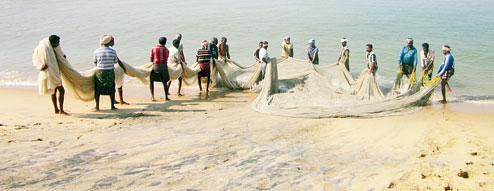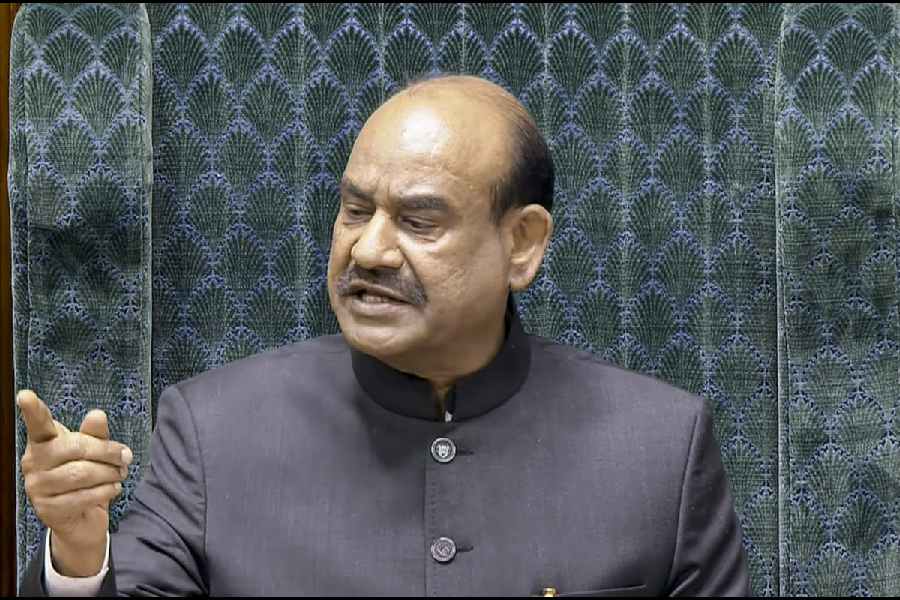 |
Tragedy stalks Abhinaya Xavier. Six years ago, she lost her parents. The 18-year-old resident of the picturesque fishing village of Eraimanthura in Tamil Nadu, close to the Kerala border, and her younger sister Aquna, turned to their 21-year-old brother Ajeesh for solace. And he promised to take care of them.
But the lively lad with a bodybuilder’s physique, who loved his football and dreamed of owning a fishing boat one day, was gunned down, allegedly by two Italian marines serving as marshals on board an Italian tanker, Enrica Lexie, in February 2012.
One year later, the two men are in the news again. Last week Italy said Massimiliano Latorre and Salvatore Girone — who had been allowed to go to Italy to vote — would not return to India. A few days ago, Rome changed its position, and said they would be back in India for their trial.
 |
| Dealing with loss: Dora Valentine with her son; (below) Ajeesh’s aunt with his photograph; (top) the Kerala coast where Jelestine and Ajeesh worked |
 |
The marines have been accused of killing two Indian fishermen aboard a small wooden fishing boat off the shores of Kerala. They claim that they mistook them for pirates.
“We are not interested in getting the marines hanged. But life has to go on for the families of the two victims,” says Father Rajesh Martin, executive director of Quilon Social Services Society, Kollam, who had liaised with the Italian government to get compensation for the families of the two Christian fishermen.
The two families were given a compensation of Rs 1 crore each by the Italian government and in return they withdrew the criminal cases against the marines. The widow of one of the killed men now wants to move on.
“I have forgiven the marines. Being a Christian, I don’t want revenge. I don’t want them to go to jail. They also have families,” says Dora Valentine, widow of Jelestine Valentine, 49. After her husband’s death, the Kerala government gave her a job as a peon in the fisheries department at the Kollam Collectorate.
Ajeesh’s family, however, is not so forgiving. “I had faith in God but he took my mother, father and now my brother. Everywhere I go, I see him standing there,” Abhinaya cries.
Sitting in a plastic chair inside their decrepit house by the seashore, Abhinaya breaks down often, as does her aunt, Jennet Mary, who had adopted her orphaned nephew and nieces after the death of her younger brother and wife in 2006.
“He was a good boy,” says Mary, who treated Ajeesh as her son after her own son died in a freak lorry accident. “He came to my house when he was just 14. He had to quit school and started contributing to the family expenses by doing odd jobs on the seashore. His dreams of getting the girls married and becoming a boat owner were squashed by a single bullet.”
It was a routine fishing expedition into the sea for Ajeesh, Jelestine and a few others when they boarded a fishing boat owned by J. Fredy, another Eraimanthura resident, early one morning. They were nine days out at sea and were relaxing in the evening after a hard day when a passing Italian tanker started shooting at them.
Jelestine, who was at the wheel, was killed instantly. Ajeesh, who heard him cry, emerged out into the open and got a bullet on his chest. The others scrambled for cover, bewildered.
“We were shot down just like dogs for no reason,” says Fredy, who is not happy with the Rs 17 lakh he got as compensation since his boat is still in police custody and the other survivors have been pressing him for money. The recent drama over the marines has brought back all those bitter memories.
“We want justice,” says Abhinaya. “The money was given to us as compensation — not to make us silent. If we had killed an Italian fisherman, Kerala would not even have existed.”
That the marines were sent home for Christmas also rankles. “Was it Christmas just for them? How do you think we celebrated it with our son gone,” Mary asks.
Ajeesh’s aunt is worried about the future. The boy’s “substantial” monthly earnings as a fisherman on his long stints at sea helped her support her large family — which includes her aged husband, mother-in-law, daughter and two nieces.
The topic of compensation has also become a sticky issue. The girls were minors and could not touch the money when it came to them (it’s only now that Abhinaya has become an adult). Mary is scared that she will be accused of taking advantage of her nieces. This also applies to the Rs 5 lakh the two girls received from the Tamil Nadu and Kerala governments. “Everyone thinks I am going to steal their money,” she says.
Meanwhile, Dora’s life at her Kollam home has fallen into a natural rhythm. Devastated at first, she had to set aside her anguish at losing her husband because of her two sons. The elder son is in an engineering college, and the younger one in school.
“I have to take care of them,” says Dora, who has bought land with the compensation money. “My husband, who had returned after working in Saudi Arabia for a long time, was a caring father. Whenever he was home from the sea, he used to play chess and cricket with my older son and help the younger one with maths,” she narrates.
Her life, she adds, has changed. “I was a housewife earlier and now I go to work. I am surrounded by good people. If I stayed home I would have brooded and become depressed,” she points out.
Her bright-eyed younger son, Jeen, is not so forgiving. The 11-year-old, after returning from school, spots a photograph of the two marines on a magazine cover. “I don’t like them,” he says haltingly.
When Kerala chief minister Oommen Chandy visited their house after the shooting, Jeen had said: “Please bring them back and shoot them.” For him, compensations are clearly not important. What’s important is the death of a father.











